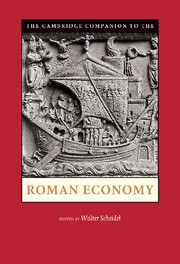Book contents
6 - Contract labor
from Part II - Labor
Published online by Cambridge University Press: 05 February 2013
Summary
The role of slave labor has rightfully been a focus of historians assessing the performance of the Roman economy. But to develop a comprehensive picture of economic relationships in the Roman Empire, one must assess the situation of the empire's vast class of small-scale landowners, tenants, artisans, and people engaging in various forms of wage labor. Often these groups overlapped. So a basic question is the degree to which economic growth in the Roman Empire benefited the vast class of working people in the Roman economy. Did the legal and social institutions surrounding the use of contract labor encourage the efficient use of resources, or did they simply promote the interests of the empire's elite at the expense of the vast majority of its population, including both farmers and urban laborers? As comparisons with later societies will show, it is unlikely that Roman workers ever escaped Malthusian constraints, so that population remained a decisive factor in determining the welfare of workers. In the Roman Empire, workers faced increasing competition as population grew over the first two centuries ce, at least until the Antonine Plague in 165 ce, which apparently caused widespread loss of life and arguably substantial economic disruption. Indeed, documentary papyri from Egypt, which provide some detailed information about wages and prices, suggest that wages and prices remained relatively stable in Egypt until in the 160s ce, when they doubled over a period of thirty years, quite possibly as a result of the loss of population. This sudden change, after a long period of stability, suggests how important population pressure was to the welfare of the empire's workers. After the 190s ce prices and wages remained stable until about 270 ce, when serious inflation set in.
- Type
- Chapter
- Information
- The Cambridge Companion to the Roman Economy , pp. 114 - 130Publisher: Cambridge University PressPrint publication year: 2012
- 4
- Cited by



